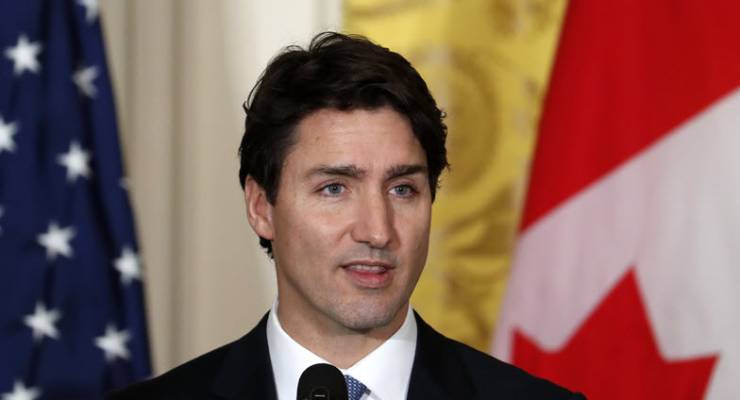
The investor-state dispute settlement (ISDS) provisions of the zombie Trans-Pacific Partnership (TPP) have been dealt a blow, but continue to live on after some shenanigans at a meeting of what is now called the “TPP 11” in Da Nang, Vietnam, late last week.
The meeting of leaders of the US-less TPP group was supposed to sign off on what has now been rebadged — in an acknowledgement of how badly damaged the TPP brand was — as the “Comprehensive and Progressive Agreement for Trans-Pacific Partnership” (CPTPP), but Canada’s Justin Trudeau didn’t show up. Exactly what happened still isn’t clear, but Trudeau has since made it clear Canada isn’t happy with the deal, which was negotiated by his neoconservative predecessor Stephen Harper. It seems likely Trudeau’s ploy was a successful effort to extract some further concessions for Canada, as well as providing some cover for his own, much more important negotiations currently underway with the toddler in the White House over the North American Free Trade Agreement (NAFTA).
The CPTPP, to be fair, has some revisions that make it an improvement on the secretly negotiated TPP (secret except for major corporations — they were given privileged access to the text). Some 20 clauses from the original document have been “suspended” (there’s a good guide here from the perspective of New Zealand, where the media have paid for more attention to all this than our own). In particular, the draconian copyright and intellectual property requirements imposed by the United States have mostly been suspended, and will have to be renegotiated if a post-Trump United States wants to re-enter the treaty.
But ISDS, under which multinational corporations can sue governments for enacting public policy measures that might affect their profits, remains in the CPTPP. New Zealand’s Jacinda Ardern, who promised to go hard on ISDS during the recent NZ election campaign, secured some curbs: ISDS won’t apply to investor screening laws that enable governments to prevent foreign investment in certain areas, and if a company enters into a contract with a government, it will be prevented from using ISDS and instead must use domestic courts for any litigation, removing the capacity of multinationals to engage in contract litigation with governments not before an actual judge, but before a pro-business “international arbitrator” without any legal framework.
The Kiwis also revealed that Malcolm Turnbull had agreed to a “side letter” that would in effect prohibit ISDS between Australia and New Zealand — suggesting Ardern made her views on ISDS loud and clear to Turnbull at their recent meeting in Sydney. But it prompts the question of why Turnbull is so eager for ISDS with other signatories when he’s happy to give it up in relation to decisions made in Wellington.
Ardern would clearly have preferred to remove ISDS altogether from the agreement, and she’s right to do so: ISDS, however limited, hands more power to multinational corporations at the expense of governments. It’s an echo of the fading era of neoliberalism, when governments reflexively bowed to corporate will, and those that didn’t were punished.
Turnbull has tried to sneak through a revival of the TPP and commit Australia to a shabby deal that even the Americans walked away from (don’t forget, Trump was at one with Clinton and Sanders on rejecting the agreement). He’s rebadged it, he’s agreed to suspend some of the worst aspects of it. But he won’t dare ask an independent body like the Productivity Commission to examine it ahead of signing Australia up to it, because he knows what it will conclude.
Turnbull and the overpaid, business-class-dwelling shiny bums of DFAT have undermined Australia’s interests with the TPP. Thankfully, there are other leaders who are doing more to stand up for the interests of Australia than they are.








Gday – deadlines seem to affect the copy some days worse than others.
“media have paid for more ” -> media have paid far more?
Note the timidity of the ABC in pressing our government on this issue in B Cassidy’s interview of Ciobo on Insiders. He allowed Ciobo to divert questions on Canada’s objections into routine blaming of Labor. If the ABC won’t then it’s up to you Crikey.
Ciobo’t – the point of his on Shorten, the gist being ‘you should believe anything our Limited News Party utters : but nothing from Labor’ – went unremarked.
Sad but true John….Cassidy and all ABC journalist are running scared of this vindictive government.
I am sick to death of IPA talking heads turning up on the ABC, as soon as I spot one now the program gets turned off.
“don’t forget, Trump was at one with Clinton and Sanders on rejecting the agreement”
Yeah, well, not exactly. Hillary was going gang busters to sign up to it until pressure from Sanders made her quietly re-think her position. She was never strongly against the TPP as Trump and Sanders were, and was as likely to forget that promise if she was elected, I susepct.
Again, what is the benefit to a nation for the ISDS provisions? This is supposed to be a trade agreement between nations, not between nations and corporations.
The DFAT shiny bums, and the corporations, should never have been allowed within a bulls roar of this. Unfortunately, they drafted and negotiated in secret, the worst of all possible worlds.
Can a COALition politician be a dual citizen with a trans national
corporation?
Nah, mate they’re automatically in the Investor’s sides of any ISDS.
Again, why worry about protecting our borders when Turnbull is happy to not provide any protection to us otherwise?
It is about time that Labor got on to Turnbull to have the Productivity Commission assess all these wonderful FTAs before signing them, as apparently all of them so far have left Australia worse off.